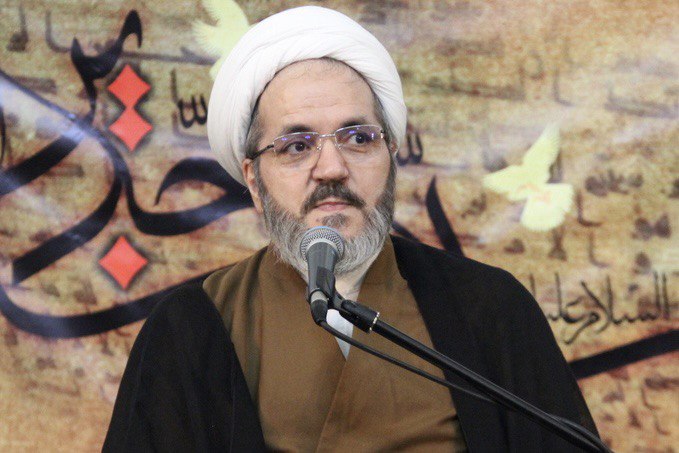Dr. Saeid Sobhani


Saeid Sobhani was born into a senior clerical family in the holy city of Qom in 1963. He completed his high school education while being spiritually trained under the guidance of his father Grand Ayatollah Ja’far Sobhani.
For two decades from 1982 to 2002, he attended the lectures of eminent scholars of Qom and mastered such disciplines as Arabic literature, logic, Islamic philosophy, exegesis of the Qur’an, the theological schools of thoughts (milal wa niḥal), the science of narrators and narrations (ʾilm al-rijāl and al-dirāyah), theology (kalām), Islamic jurisprudence (fiqh) and the principles of jurisprudence (uṣūl al-fiqh).
He received his advanced seminary training under three senior Ayatollahs. He was a student of Grand Ayatollah Abdollah Javadi Amoli and attended his discourses on exegetical sciences and philosophy. He received his advanced training in jurisprudence under the late Grand Ayatollah Mirza Javād Tabrīzī. Simultaneously he also attended classes offered by his father on uṣūl al-fiqh and theology. These three erudite scholars have played the most important role in shaping his system of thoughts. In addition to pursuing his advanced training, he also taught in the most prominent universities and seminaries of Iran.
Having been immersed in the ocean of spirituality and knowledge of the holy city of Qom for two decades, Sobhani moved to the U.K. in 2002 to serve as a resident ‘ālim as well as to pursue his advanced academic training in a Western context. He received his M.A. in Inter-Faith Relations from the University of Glasgow and his Ph.D. in Philosophy of Religion from the University of Edinburgh.
His two-decade-long sojourn in the West has further amplified his understanding of Western academic tradition as well as Occidental cultural currents. He is currently serving as a senior lecturer at the Islamic College and Hawza ‘Ilmiyya of England in London.
He has published a number of articles and books (in English, Farsi, and Arabic ) on a wide array of subjects including theology, philosophy, jurisprudence, the principles of jurisprudence, exegesis of the Qur’an, history, rijāl studies and fundamentals of belief. His publications include Religious Diversity in Contemporary Shi‘i Thought (2022), Nayl al-Waṭar min Qā’idah lā Ḍarar (The Jurisprudential Maxim of No Harm, 1999) and Jahān-bīnī va Shinākht (Epistemology, 1988)
Fields of Interest
Philosophy, Theology, Philosophy of Religion, Islamic Jurisprudence (Fiqh), the Principles of jurisprudence (ʿIlm Uṣūl al-Fiqh), the science of narrators and narrations (ʿilm al-rijāl and dirāyah), history of Islam.
Education
PhD (Philosophy of Religion) University of Edinburgh, 2019
MA (Interfaith relations) University of Glasgow, 2009
Post-doctoral level course (Kharij), Jurisprudence (Fiqh), Seminary of Qom, 1991-2002
Supervisor: Ayatollah Mirza Javad Tabrizi
Post-doctoral level course (Kharij), Principles of Jurisprudence (ʿIlm Usul al-Fiqh), Seminary of Qom, 1991-2002
Supervisor: Ayatollah Ja’far Sobhani
Advanced Islamic Philosophy (Asfar); under the personal supervision of Ayatollah Javadi-Amoli, 1997-2002
Advanced Philosophy and Theology, Imam Sadiq Institute, (Qom) 1991-1995
Key modules: Philosophy, Theology, Hermeneutics, Logic and Ethics.
Advanced Interpretation of the Qur’an (Kharij Tafsir), 1988-2002
Supervisor: Ayatollah Javadi-Amoli
BA, Islamic Studies, Seminary of Qom, 1983-1991
Key modules: Arabic literature, logic, Islamic philosophy, Quranic sciences, interpretation of the Quran, the Theological Schools of Thought (Milal va Nihal), the science of narrators and narrations(ʾIlm al-Rijal and al- Dirayah), Theology, Islamic Jurisprudence (Fiqh) and the Principles of the science of jurisprudence (ʾIlm Usul al- Fiqh)
Books
Dirayah Studies: An Introduction. London: Contemporary Thoughts Press, 2025. (forthcoming)
Worldview and the Theory of Knowledge. London: Contemporary Thoughts Press, 2023.
Rijal Studies: an Introduction. London: Contemporary Thoughts Press, 2023.
Religious Diversity in Contemporary Shi’i Thought. London: ICAS Press, 2022.
Jahān-bīnī va Shinākht (Epistemology). Qom: Imam Ṣādiq Institute, 1988.
Nayl al-Waṭar min Qāʿidah lā Ḍarar (The Jurisprudential Maxim of No Harm). Qom: Imam Ṣādiq Institute, 1999.
Lubb al- ʾAthar fī al-Jabr wa al-Qadar (Predestination and Free will). Qom: Imam Ṣādiq Institute
Articles
“Prophet Muḥammad and his Miracles: Critiquing ʿAlī Dashtī’s View”, Journal of Shi‘a Islamic Studies (JSIS), 2025. (forthcoming)
“A Critical View on Sayyid Quṭb and the Status of Intellect (ʿAql)”, Journal of Shi‘a Islamic Studies (JSIS), 2024.
“The Role of Intellect in the Perspective of Imamiyyah Jurists”, al-Qalam Journal. 2024.
Imamate and the Principle of Loving-Kindness. The Journal of ‘Contemporary Study of Islam’ (JCSI). 2022.
Pluralism Dīnī dar Chishm Andāz-i mā (Religious Pluralism in our Perspective). Journal of Islamic Theology. 2007.
Sharī’at Fāragīr va Jāhanī va Nasikh Sharāyiʿ Pīshīn, (The Universal Shari’at and the Abrogator of the Previous Sharayiʿ). Journal of Islamic Theology. 2007
Gūshe’ī az Munāzirātpi kalāmī (A Brief Account of Theological Debates), Journal of Islamic Theology.1995.
Āmūzi-i hāy-i Ghīyām-i ʿĀshūrā (The Teachings of the ʿĀshūrā Movement), Journal of Islamic Theology, 2008.
Kūdāmyik az du ṭaʿbīr ṣaḥīḥ āst, “Kitāba Allah va ʿItratī Ahl al-Baytī” ya “Kītāba Allah va Sunnatī”, (Which one of these two title is correct: the Qur’an and my ʿItrah or the Qur’an and my Sunnah) Journal of Islamic Theology. 1995
Teaching
Advanced Islamic Philosophy (Sharḥ-i Manẓūmih al-Sabzivārī)
Undergraduate and postgraduate courses in The Elements of Islamic Metaphysics (Main texts for each course respectively: Bidāyah al-Ḥikmah and Nihāyah al-Ḥikmah) - The Islamic College, Seminary of Qom
Undergraduate and postgraduate courses in Logic. The Islamic College, Seminary of Qom
Undergraduate and postgraduate courses in Ethics. The Islamic College, Seminary of Qom
Undergraduate and postgraduate courses in the Philosophy of Religion: Hermeneutics, Epistemology, Religious Pluralism, Religious Experience. The Islamic College, Seminary of Qom
Undergraduate and postgraduate courses in Theology. The Islamic College, Imam Sadiq Institute
Undergraduate and postgraduate courses in the history of the Islamic Schools of Thought (milal and nihal). The Islamic College, Seminary of Qom
Undergraduate and postgraduate courses in The Principles of Jurisprudence. The Islamic College, Seminary of Qom
Undergraduate and postgraduate courses in Jurisprudence. The Islamic College, Seminary of Qom
Undergraduate and Postgraduate courses in the exegesis of the Qur’an (sequential and thematic). The Islamic College, Seminary of Qom
Undergraduate and Postgraduate courses in the science of narrators and narration (‘ilm al-rijal and al-dirayah). The Islamic College, Seminary of Qom
Undergraduate courses in Arabic Grammar. The Islamic College, University of Qom
Copyright (c) All rights reserved saeidsobhani.com